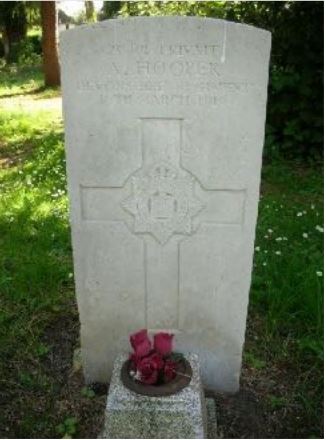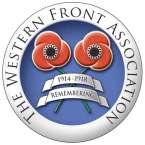Devonshire Regiment

Albert Edward Hooper was born at Kinsham in 1888 to James Hooper and Annie Hooper (formerly Tandy). James was born in Overbury and worked as an Agricultural Labourer or Cowman, whilst Annie came from Stoke Heath in Worcestershire. James and Annie had a total of eight children.
In 1901 the family was living at Church Street, Bushley with seven of the children still at home. Albert subsequently moved to Tewkesbury where he was employed as a Porter for Mrs Saunders, Grocer, in the High Street.
On 24 May 1915 Albert married Susan Annie Barnes; he was living in Eagles Alley at the time and described himself as a Labourer. Subsequently, Albert and Susan had two children: Edith on 5 September 1915 and Rose Hannah on 14 January 1918. This suggests that Albert may have been away from home with the army between June 1915 and the autumn of 1917. However, Edith was not baptised at the Holy Trinity Church until 12 September 1917. When Rose was baptised on 21 December 1919 it was recorded that her ‘father [was] deceased – killed on active service’ although he actually died of pneumonia in Dorset.
Albert joined the Army in June 1915, shortly after his marriage, but was not listed as an Abbey volunteer, perhaps because he was by then living in Bushley. He served initially in the Devonshire Regiment before being transferred to the Labour Corps. In early 1916, a number of battalions within infantry regiments, mainly composed of men who had been medically rated below the ‘A1’ condition needed for front line service, were formed into Labour Battalions. In the case of the Devonshire Regiment there were three such battalions, the 12th, 13th and 14th and it is likely that Albert joined one of them. Shortly afterwards, in April, the labour battalions within infantry regiments were transferred to the Labour Corps, an organisation that had itself been formed only in January 1917, in order to merge labour resources in the British Army into a single body. The infantry battalions became Labour Companies within the Labour Corps which suffered from a perception as being something of a second class organisation; indeed the evidence suggests that casualties tended to be commemorated under their parent regiment, hence Albert’s headstone in Tewkesbury Cemetery shows the regimental badge of the Devonshires. It is not clear if Albert served abroad, the apparent absence of any medal records suggests not. In that case Albert probably served in the 13th Battalion, Devonshire Regiment which remained in the UK for the duration of the war and became the 3rd Labour Battalion.
Private Albert Edward Hooper died on 16 March 1919, at the age of 30, as a result of pneumonia; he had been a patient in the Blandford Camp Military Hospital on Salisbury Plain. The Register reported his death on 22 March. Albert was said to be serving with the Army Service Corps (ASC). He was considered to be ‘a steady, worthy young man’. He was granted a military funeral when he was buried in Tewkesbury Cemetery: the first part of the service was conducted in the Abbey, where the Vicar officiated. The coffin was covered with the Union Jack, and Mr Percy Baker, the Abbey Organist, gave an impressive rendering of the ‘Dead March’ in ‘Saul.’ A number of discharged and demobilised soldiers attended under Sergeant-Major Curtis and, at the graveside, the ‘Last Post’ was sounded by Bugler Crockett.
Mrs Annie Hooper was living in Spring Gardens when Albert died. Since he had moved to Tewkesbury by the time of his death, the Abbey authorities added his name to its own memorial, albeit late in the day, but his name was commemorated in the normal way on the Cross. There is no evidence that Susan Hooper re-married in Gloucestershire after 1919 and indeed she was living at 18 Oldbury in 1939-40.
Researched by Malcom Waldron 9 November 2015
